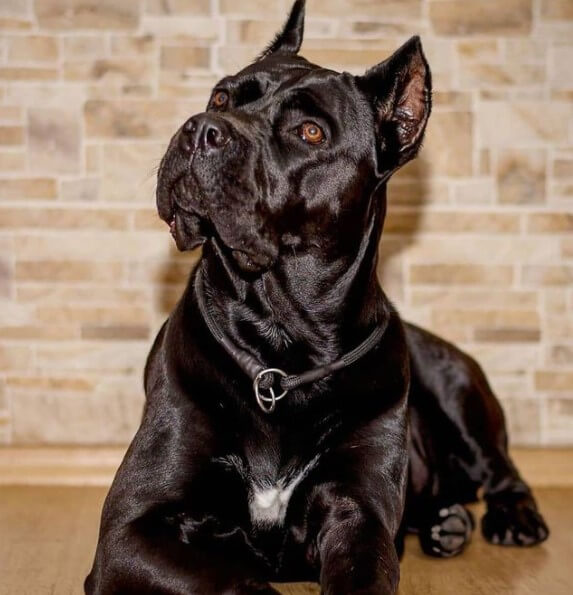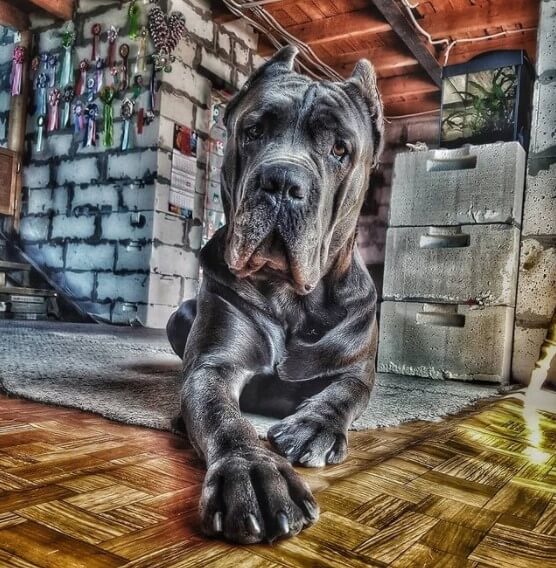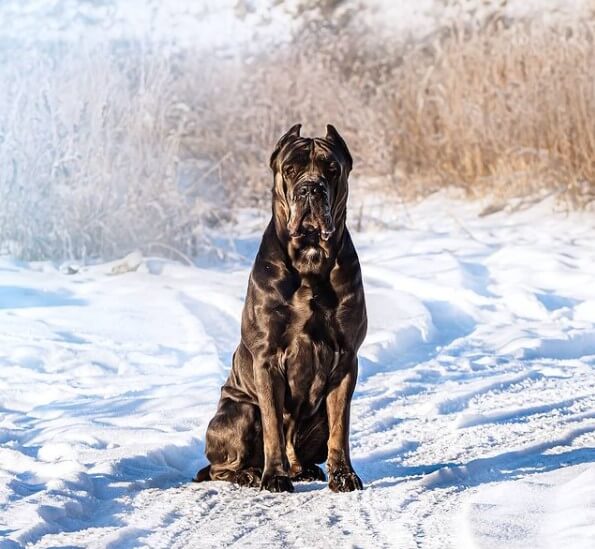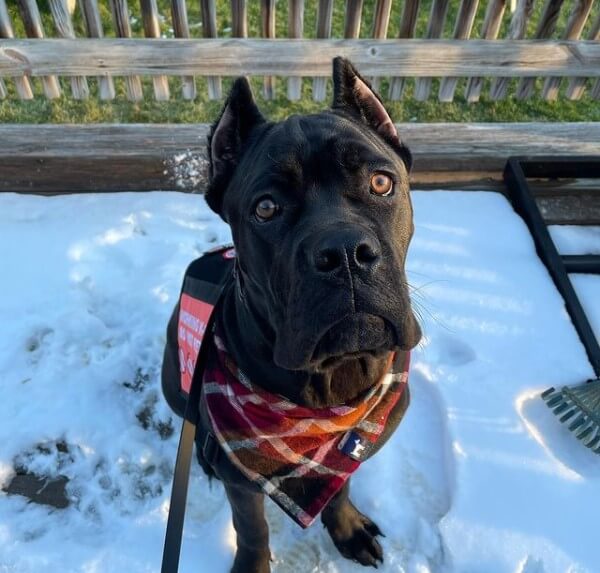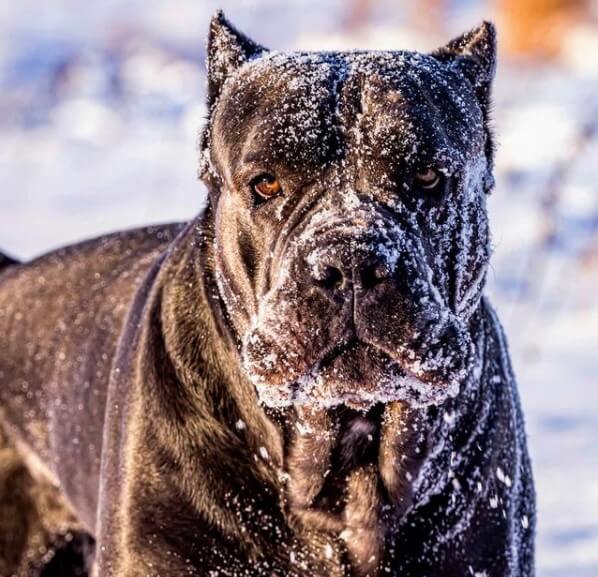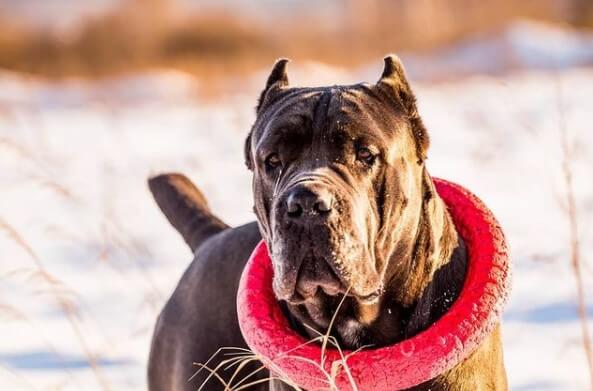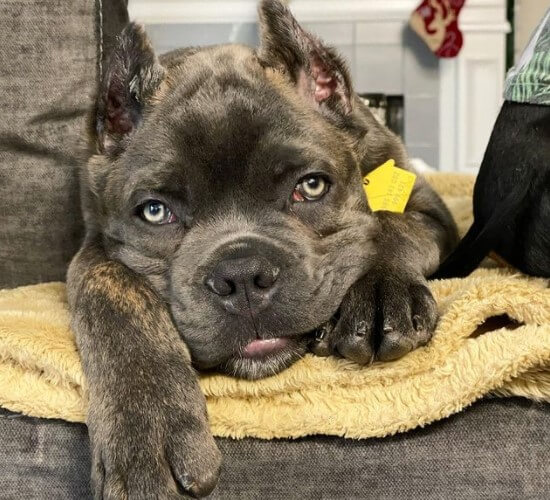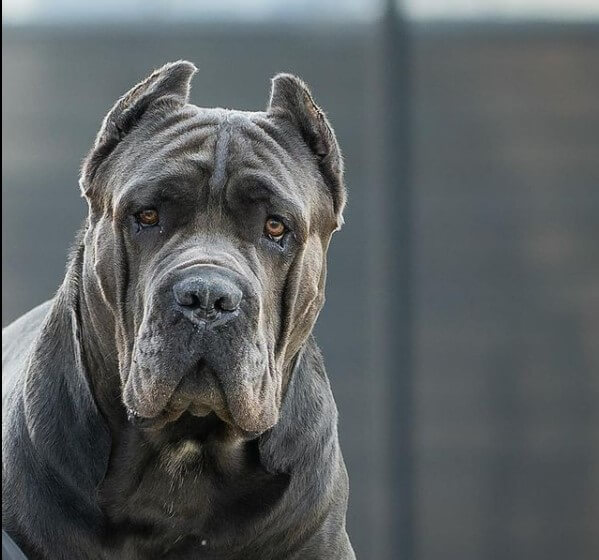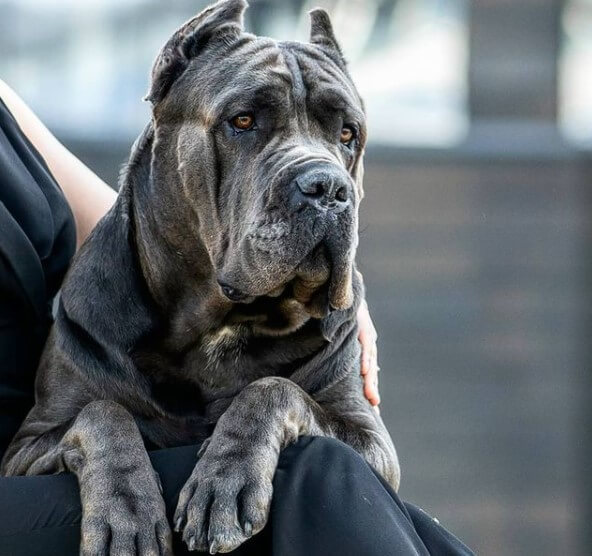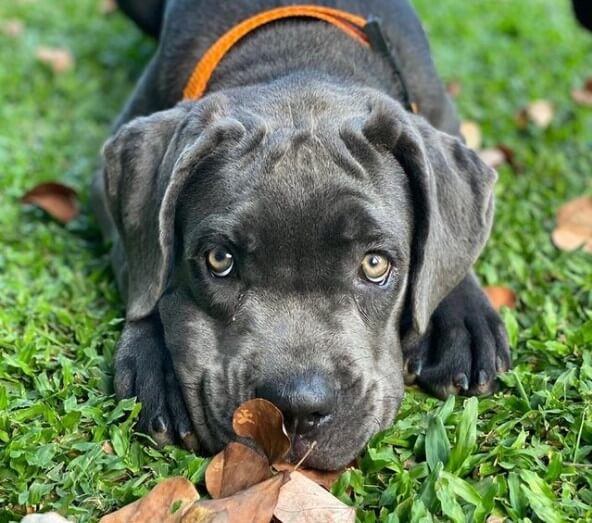Modern Cani Corsi are descendants of gladiator dogs, they breathe natural strength and greatness. They look harsh, they can even inspire fear, but in fact, they become true friends for their masters and remain them throughout their lives. As the fourteenth breed bred in Italy, the Cane Corso is the pride and national treasure of this country. In the nature of the dogs, the selflessness of the shepherd and the courage of the fighting breeds are surprisingly intertwined, and the lively temperament of the Italians themselves is also reflected.
Cane Corso has sensitivity and intuition, they are ready to protect the owner and his family at any time and in any situation, which makes them unsurpassed guards. If you live in a dog of this breed, there is no need for alarm systems. They will not meet a thief who has penetrated the house with aggression, which is how they differ from other guard dogs, but the robber will very much regret meeting the native of the sunny Apennines. The aggressive reaction of the Cane Corso leaves for an extreme case when he feels that a real threat is hanging over the owner and his property.
Brief Information
- Breed name: Cane Corso
- Country of origin: Italy
- Weight: males 45-50 kg, females 40-45 kg
- Height (height at withers): males 64-68 cm, females 60-64 cm
- Life span: 9-11 Years
Key Facts
- This dog has excellent guarding qualities. The territory inhabited by the owner and members of his family is considered his own space and is guarded with special care.
- Cane Corso by its nature is not aggressive, but if uninvited guests show up, they will certainly feel the harsh nature of the “Italian”.
- Representatives of the breed are strong and hardy, they are distinguished by intelligence and ingenuity, they need constant physical and mental activity.
- In the pack, Cane Corso demonstrates dominant character traits, tries to lead. Some canine strength can be a tough test for inexperienced owners, so if this is your first time choosing to own a dog, start with a different breed.
- Cane Corso can be aggressive towards other dogs and animals, and to keep such emotions in check, puppies need to be socialized from an early age.
- Outwardly, they look imposing and unhurried, but this impression is deceiving. As real “temperamental Italians”, they willingly join the games, love to run, and, in general, spend their time actively.
- They get along well with children, becoming a reliable nanny for them. This is how the genes of distant ancestors – herding dogs, for which the owner and his family, including domestic animals, were objects of control – make themselves felt.
- Cane Corso is characterized by kindness and attentiveness, they are affectionate with the owner and require reciprocity.
History of the Cane Corso Breed
Cane Corso is a truly legendary breed because they are direct descendants of Roman fighting dogs. It belongs to the Mastiff type and is “cousin” in relation to the Neapolitan Mastiff. Many breeders believe that the breed originated naturally but with the help of human intervention. We can say that people intervened in the process at a certain stage of development and directed it in the right direction. Cane Corso has changed little in 2000 years. Moreover, both externally and internally.
Nobility, loyalty, and fearlessness are inherent in them as well as their illustrious ancestors, although in the Middle Ages the breed was mainly used not in war, but in hunting and farming. They went with them to big game, mainly wild boar, used as a guard when they led cattle to the market, and as a watchman for their home. In other words, the medieval inhabitants of Italy used the dogs that lived in the country from time immemorial.
The dogs interbred with each other, often in a free manner, but the full-fledged Cane Corso breed began to develop under serious, professional human supervision only in the 1970s when the mechanization of agriculture and the reduction of farmland in Italy led to a sharp decline in the number of these dogs. At that time, breeders made efforts to keep the Cane Corso from disappearing completely, and they also began to maintain a uniform breed standard.
In 1983, breed enthusiasts created a community of owners, the Amatori Cane Corso, to standardize and maintain the breed. The Cane Corso received official recognition in 1996, which is actually somewhat strange, given the deep historical roots of these dogs.
The word “canis” in Latin is a dog, and the word “Corso” is most likely derived from “cohors”, which means “bodyguard”, but it can also come from the old Italian word “corsus”, which means “strong “Or” reliable “.
Appearance
The Cane Corso breed is a large, massive, muscular, and well-balanced dog with an athlete’s physique. A dog with a broad head and short muzzle, a black nose, and strong jaws.
The rib cage is wide, pronounced, like the abdominal cavity, the limbs are of medium length, with good musculature. The ears are often docked, the tail is medium, the coat is short and glossy. May have a small patch on the chest or legs.
Personality
The Cane Corso breed has a noble, balanced character and does not waste on trifles. These dogs retain the pride and strength of their great ancestors, which can be seen at first glance. The Cane Corso breed is exceptionally devoted to its family, and if you are looking for a family companion that combines all the best qualities of a strong and intelligent dog, this is what you need.
Basically, they are distinguished by obedience, devotion, high intelligence, and gentle, kind character. They are cold-blooded and can remain calm even if the other dog is trying to infuriate, but if it comes to a fight, the Cane Corso will be in a battle to the last and will not retreat even in front of a superior opponent. Their kindness and friendliness are directed primarily towards their family, or towards the owner, if the pet lives with one person.
Strangers, friends of the owners are of little interest to him, so to speak – “for as long as for”. Sometimes it may even seem that he does not particularly notice other people and animals until they come close to a close distance – then the dog notes the presence of a foreign creature, and makes sure that this very creature, even in thoughts, does not harm those close to her people.
Thanks to the vast past and the all-round experience that is embedded in the genes, the breed can perform a wide variety of functions. It all depends on what the owner needs. Cane Corso can be a protector, watchman, hunt help, or just a good friend. In any case, the dog will show itself in the best possible way.
But one should not forget that this is an animal with great inner strength, and therefore, it will check the character of the owner. That is to say – to study the boundaries of what is permitted. Consequently, Cane Corso is not recommended for inexperienced and indecisive owners, since the owner sometimes must be able to rigidly put himself in the position of a leader. Children are treated with kindness, without aggression.
These dogs need early socialization, acquaintance with other people and animals to broaden their horizons, and cats are also better introduced to them at an early age. They have a fairly high level of energy, they like walks, active games, and physical activity. Without activity, without occupation, and loving people nearby, the dog quickly begins to wither, its character deteriorates, it can stop eating normally or, on the contrary, turn into a glutton.
Training
The Cane Corso dog breed is very smart and therefore can learn a lot of different commands. In addition, if you create the right relationship with your pet, sometimes you don’t even need a command – the dog will understand what the owner wants from it. On the other hand, this requires the right upbringing, this is a strong leadership position.
To achieve this, try to use commands more often in everyday life. Also, at an early age, you will have to face attempts at dominance, and here you will also need to prove yourself as a strong and confident leader. Aggression, negative attitude is unacceptable, as the dog will not simply love and respect you.
Just do not give toys until the pet obeys the command, delay eating if he does not want to obey you or behaves disgustingly, do not hesitate to scold him and behave strictly when necessary, and most importantly, never be afraid of your dog. If you don’t know how to be confident around a large dog, it is better to have a small one. Another tip – to develop independence and self-confidence, starting from adolescence, leave your pet alone, for a short time, in an apartment or in the yard if you have a private house. It will do him good.
Conditions of Detention
It is believed that in an ordinary city apartment, even small dogs can create inconveniences for their owners, not to mention large ones. Cane Corso totally refutes this stereotype. Despite the fact that they are not small dogs, they do not need a large space due to their inactivity.
By their nature, “Italians” are too freedom-loving and need to be constantly near the owner. In addition, the dog’s light undercoat is not able to warm it in severe frosts, so the Cane Corso still cannot be a “yard resident”.
You should regularly walk with your pet, do not deprive him of the joy of outdoor activities. Leaving the dog outside the home and thereby changing the environment, you bring the necessary variety into its life, which has a positive effect on the nervous system and helps it not to weaken.
At the same time, joint walks strengthen the mutual understanding of the owner and his four-legged friend. You should walk with the dog for at least an hour at least twice a day. Cane Corso Italiano, like their breeds of other large breeds, is prone to diseases of the musculoskeletal system. If your pet is less than two years old, do not overload it with long runs, let alone pushing high barriers frequently.
Care
Cane Corso is a smooth-haired breed, and therefore almost does not need hair care. Brush it out once a week and bathe it at least once a week. Always keep your dog’s ears and eyes clean and trim the nails three times a month.
This breed requires at least 90 minutes of exercise a day to keep its muscles in top shape.
Feeding
You can feed Cane Corso both natural products and ready-made food, but the only premium. The main advantage of finished feed is that it saves time, but is expensive. Quality products are also expensive, and you have to spend time preparing them. But on the other hand, during the cooking process, you see what exactly the Cane Corso ration is made of, which cannot be said about the ready-made feed.
Each type of feeding has its pros and cons, and which one is right for your pet is up to you. The main thing is that the well-being and health of your dog do not suffer from this.
Health
Cane Corso Italiano is the embodiment of strength and endurance and, it would seem, he cannot have any diseases. However, it is not. Representatives of this breed suffer from a number of hereditary ailments, the most common of which is hip dysplasia. This disease is practically not amenable to treatment, and in some cases, sadly, the dog has to be put to sleep. There is a hereditary predisposition to this disease, but even experienced breeders often cannot recognize it in a puppy. Before buying a puppy, you can ask if he had an X-ray, which, however, does not completely ensure against illness. For a greater guarantee, you should purchase an already grown puppy. Its cost will be much higher, but it will pay off with the minimal risk of developing hereditary diseases.
In addition to hip dysplasia, representatives of the breed can suffer from various types of allergies, bloating, cherry eye, epilepsy, thyroid diseases (hyperthyroidism), eyelid diseases (eversion or volvulus).
How to Choose a Puppy
Check the breed standard before making your choice. It will be useful to visit mono shows: this will allow you to learn about the Cane Corso, as they say, firsthand and choose the puppy’s parents. Be sure to take a closer look at the mother’s exterior and behavior.
The kid should be well-fed, very active. Ask the breeder about the character of your chosen puppy, ask to focus on the features of his behavior. When buying, ask for a veterinary passport.
